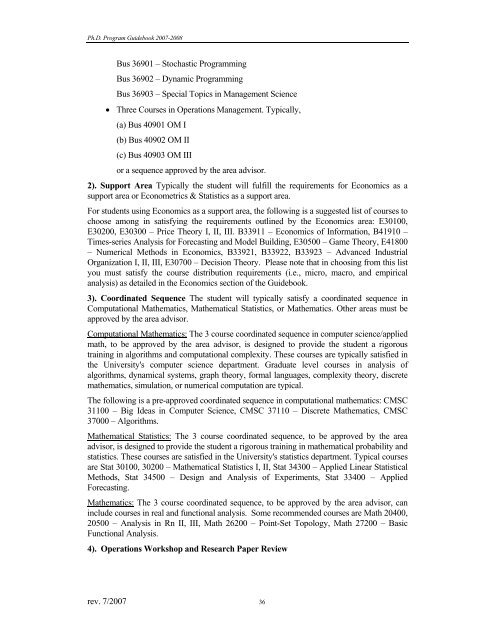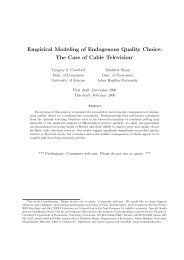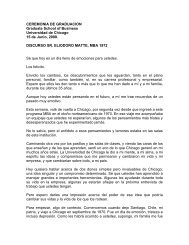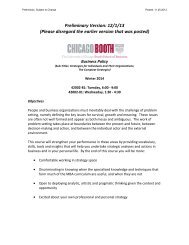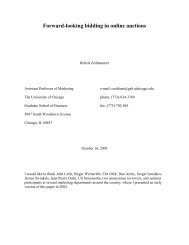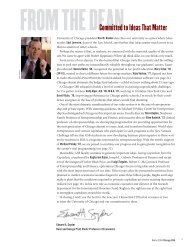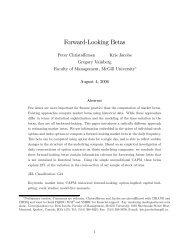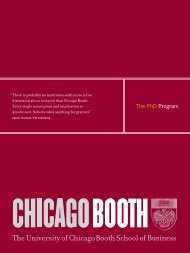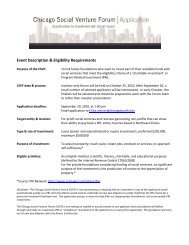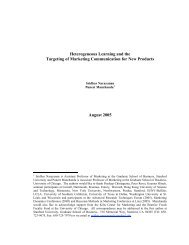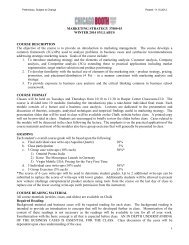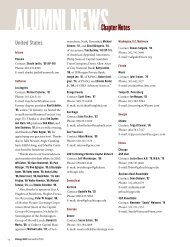Ph.D. Program Guidebook - The University of Chicago Booth School ...
Ph.D. Program Guidebook - The University of Chicago Booth School ...
Ph.D. Program Guidebook - The University of Chicago Booth School ...
Create successful ePaper yourself
Turn your PDF publications into a flip-book with our unique Google optimized e-Paper software.
<strong>Ph</strong>.D. <strong>Program</strong> <strong>Guidebook</strong> 2007-2008<br />
Bus 36901 – Stochastic <strong>Program</strong>ming<br />
Bus 36902 – Dynamic <strong>Program</strong>ming<br />
Bus 36903 – Special Topics in Management Science<br />
• Three Courses in Operations Management. Typically,<br />
(a) Bus 40901 OM I<br />
(b) Bus 40902 OM II<br />
(c) Bus 40903 OM III<br />
or a sequence approved by the area advisor.<br />
2). Support Area Typically the student will fulfill the requirements for Economics as a<br />
support area or Econometrics & Statistics as a support area.<br />
For students using Economics as a support area, the following is a suggested list <strong>of</strong> courses to<br />
choose among in satisfying the requirements outlined by the Economics area: E30100,<br />
E30200, E30300 – Price <strong>The</strong>ory I, II, III. B33911 – Economics <strong>of</strong> Information, B41910 –<br />
Times-series Analysis for Forecasting and Model Building, E30500 – Game <strong>The</strong>ory, E41800<br />
– Numerical Methods in Economics, B33921, B33922, B33923 – Advanced Industrial<br />
Organization I, II, III, E30700 – Decision <strong>The</strong>ory. Please note that in choosing from this list<br />
you must satisfy the course distribution requirements (i.e., micro, macro, and empirical<br />
analysis) as detailed in the Economics section <strong>of</strong> the <strong>Guidebook</strong>.<br />
3). Coordinated Sequence <strong>The</strong> student will typically satisfy a coordinated sequence in<br />
Computational Mathematics, Mathematical Statistics, or Mathematics. Other areas must be<br />
approved by the area advisor.<br />
Computational Mathematics: <strong>The</strong> 3 course coordinated sequence in computer science/applied<br />
math, to be approved by the area advisor, is designed to provide the student a rigorous<br />
training in algorithms and computational complexity. <strong>The</strong>se courses are typically satisfied in<br />
the <strong>University</strong>'s computer science department. Graduate level courses in analysis <strong>of</strong><br />
algorithms, dynamical systems, graph theory, formal languages, complexity theory, discrete<br />
mathematics, simulation, or numerical computation are typical.<br />
<strong>The</strong> following is a pre-approved coordinated sequence in computational mathematics: CMSC<br />
31100 – Big Ideas in Computer Science, CMSC 37110 – Discrete Mathematics, CMSC<br />
37000 – Algorithms.<br />
Mathematical Statistics: <strong>The</strong> 3 course coordinated sequence, to be approved by the area<br />
advisor, is designed to provide the student a rigorous training in mathematical probability and<br />
statistics. <strong>The</strong>se courses are satisfied in the <strong>University</strong>'s statistics department. Typical courses<br />
are Stat 30100, 30200 – Mathematical Statistics I, II, Stat 34300 – Applied Linear Statistical<br />
Methods, Stat 34500 – Design and Analysis <strong>of</strong> Experiments, Stat 33400 – Applied<br />
Forecasting.<br />
Mathematics: <strong>The</strong> 3 course coordinated sequence, to be approved by the area advisor, can<br />
include courses in real and functional analysis. Some recommended courses are Math 20400,<br />
20500 – Analysis in Rn II, III, Math 26200 – Point-Set Topology, Math 27200 – Basic<br />
Functional Analysis.<br />
4). Operations Workshop and Research Paper Review<br />
rev. 7/2007 36


